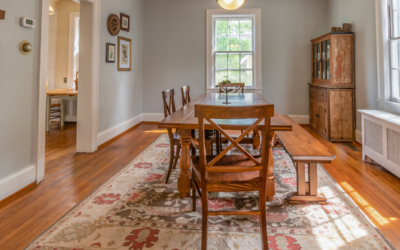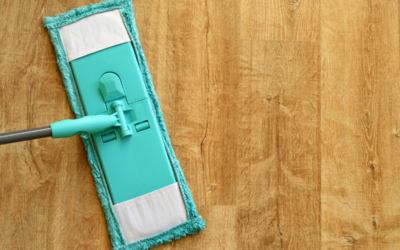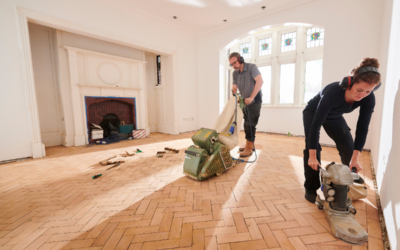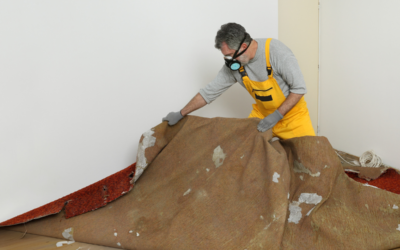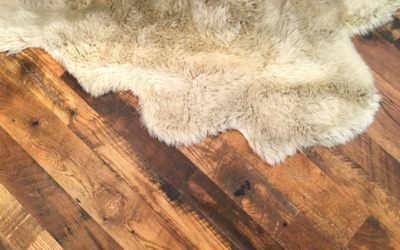Follow These Care Tips for Cleaning Your Wood Flooring
If you’re new to hardwoods, or if you aren’t sure you’ve been taking care of yours properly, you’ve come to the right place. In this guide, we’ll help you determine the type of hardwood floors you have, guide you through damage prevention, and provide helpful cleaning tips.
Understanding Your Hardwood Flooring
Start your floor care journey by identifying the type of wood flooring you have. Most can be broadly categorized as solid or engineered wood. Recognizing the type of hardwood floors you have lays the groundwork for proper maintenance.
Solid hardwood floors are crafted from single pieces of wood, making them a classic and durable option. They can be refinished multiple times during their lifespans. If you own an older home, and your floors are original, they likely fall into this category.
Engineered wood consists of multiple wood layers bonded together, topped with a hardwood veneer – a thin layer of solid wood that is essentially glued on. Engineered wood is stable in environments where humidity fluctuates. It is more resistant to moisture damage than solid woods. However, engineered hardwood comes with more specific cleaning requirements to protect its finish and construction.
Take Steps to Prevent Damage to Your Wood Flooring
Preventative care safeguards your wood floors, so they last longer and look beautiful. Follow these tips to help prevent scratches, dings, gouges, and other damage to your floors.
- Never wear high heels or cleats inside your home. They can act like chisels, causing dent and scratches.
- Trim your pets’ nails to reduce scratches on the surface of your floors.
- Place protective pads under the legs of your furniture. Furniture items used daily can cause significant wear and tear without them.
- Keep your floors clean. Dirt and debris acts like sandpaper underfoot, gradually wearing away your floor’s finish. Place area rugs and doormats at entryways to prevent the spread of this grit, or implement a no-shoes policy in your home.
- When rearranging furniture or moving heavy items, always lift rather than drag. Dragging can leave scratches behind. Use an area rug under furniture that is moved frequently, like dining room chairs.
- Address spills or leaks right away to avoid significant water damage. Soak up small spills with a soft cloth.
- Hang curtains or window shades that block the sun’s rays. UV rays can cause wood floors to warp over time.
By following these preventative measures, you can reduce the risk of damage to your wood flooring, keeping them in good condition for as long as possible.
Cleaning Best Practices for Hardwood Flooring
Basic Cleaning For Hardwood Floors
Begin with regular dusting and sweeping using a soft-bristled broom or microfiber mop to collect dust, pet hair, and other debris. When mopping, a damp – not wet – mop is key. Too much water, and you risk water damage. When sweeping or mopping, follow the grain of the wood.
It’s best to avoid steam cleaners on hardwood floors. The high heat and moisture can cause warping, splitting, or cracking. Truly, a slightly damp mop is the best tool you have to keep your floors in pristine condition.
Regular cleaning is beneficial, but over-cleaning or using too much product isn’t. Following a balanced approach to cleaning, combining gentle tools and appropriate cleaning products, will keep your floors in the best possible condition.
The Best Vacuum For Wood Floors
If you must vacuum your wood floors, opt for one designed specifically for the surface. The best vacuums for wood floors don’t have a beater bar, which can scratch your floors during the course of vacuuming.
Adjust vacuum settings to prevent inadvertent damage, and choose a vacuum with less abrasive wheels.
Safe Hardwood Floor Cleaners
The cleaning solutions you use on your wood flooring should be mild and pH-neutral so as not to damage your hardwoods’ finish. Avoid products that contain vinegar, ammonia, bleach, hydrogen peroxide, or abrasive substances. Over time, these will dull your floor’s finish.
Hardwood flooring experts and manufacturers recommend a gentle, water-based hardwood floor cleaner, such as Bona. Other budget-friendly options are available; carefully read cleaner bottles to ensure you’re choosing one that won’t harm your floors.
Get Wood Flooring Cleaning Advice From Professionals
When cleaning and maintaining your hardwood floors, it’s best to avoid any trending “cleaning hacks” you found online and go straight to the source: hardwood flooring professionals in your area. They can offer expert advice that will keep your floors looking their best and help you address any concerns you have about your floors.
Contact a local hardwood flooring company to get answers to your questions.




